

25 BEST WEBSITES FOR LEARNING ENGLISH. I want the new e-book!
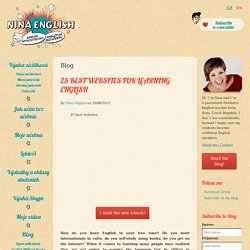
How do you learn English in your free time? Do you meet internationals in cafés, do you self-study using books, do you get on the internet? When it comes to learning many people have realized they are not going to acquire the language just by sitting in classrooms. But not everyone has the opportunity to walk out to the street and start practising with the passers-by. Most of us, who are learning English, don’t live in an English-speaking country. If you are reading this blog post you know what the answer is already… We are in English learning heaven these days as tons of interactive resources and platforms to communicate live with others are available online. The History of English in ten minutes.
10 Good Tools to Help Students Learn New Vocabulary Words. As I do every year, I am taking this week to relax, recharge, and ski with friends.

While I'm away I will be re-running the most popular posts of the year. This was one of the most popular posts in September, 2015. A couple of weeks ago I published a video about using Vocabulist to create vocabulary lists and study sheets from a document. This week, I was contacted by a reader who liked Vocabulist for her own use but wanted something a little different (easier to use) for her students. Over the years I've reviewed a number of tools that students can use to help them learn new vocabulary words. How in questions -ENGAMES.
The word “HOW” is one of the most productive words in English.
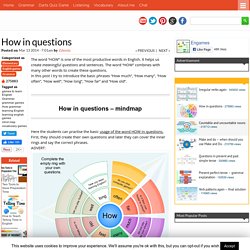
It helps us create meaningful questions and sentences. The word “HOW” combines with many other words to create these questions. In this post I try to introduce the basic phrases “How much”, “How many”, “How often”, “How well”, “How long”, “How far” and “How old”. How in questions – mindmap Here the students can practise the basic usage of the word HOW in questions. The way you can create questions with how.
In the first game your task is to complete the questions with the correct word. Teacher Invaders. The Seven Deadly Sins of Punctuation. While there are countless ways to ruin good writing, there is probably no quicker way to lose writing credibility than by exhibiting punctuation errors.
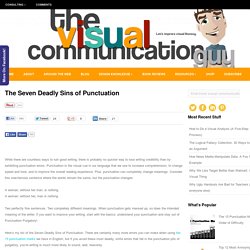
Punctuation is the visual cue in our language that we use to increase comprehension, to change speed and tone, and to improve the overall reading experience. Plus, punctuation can completely change meanings. Question Words - What, where, Who, why, when, which, how, Grammar Activity. Practice Question Words - What, where, Who, why, when, which, how, in this Grammar Activity, using this ESL Grammar Interactive Monkey Fun Game for elementary and pre-intermediate.
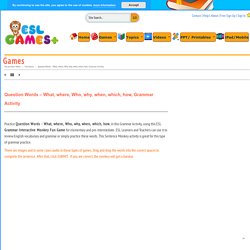
ESL Learners and Teachers can use it to review English vocabulary and grammar or simply practice these words. This Sentence Monkey activity is great for this type of grammar practice. There are images and in some cases audio in these types of games. Drag and drop the words into the correct spaces to complete the sentence. After that, click SUBMIT. Passive Voice: When to Use It and When to Avoid It. Printable PDF Version Fair-Use Policy What is passive voice?
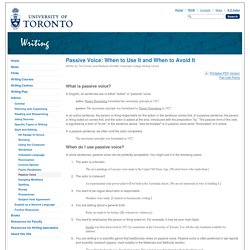
Adverbs of frequency. Teaching adverbs of frequency has to consist of several steps.
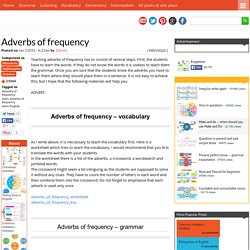
First, the students have to learn the words. If they do not know the words it is useless to teach them the grammar. Once you are sure that the students know the adverbs you have to teach them where they should place them in a sentence. It is not easy to achieve this, but I hope that the following materials will help you. What Would You Rather? 6 ESL Activities for Reviewing the Conditional. Learn English Grammar: Adverbs of Manner. Comparison of Adjectives. 1.
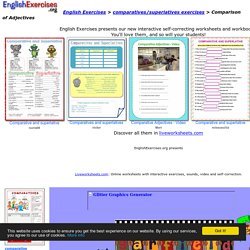
Apples are than chips. (healthy) 2. Elephants are (big) than bears. 3. 4. 5. 6. 7. Big, Big, Big (The Adjective Song) Countable - uncountable nouns exercises. Games to Learn English - For Students. Sound Grammar.
Relative Clauses. Writing – Relative Clauses overview. Articles/Determiners - Grammar for Kids. Learn English tenses through pictures with examples. Present Tenses | Past Tenses | Future Tenses | Examples The Present Tenses Present Simple Present Progressive/Continuous Present Perfect Simple.
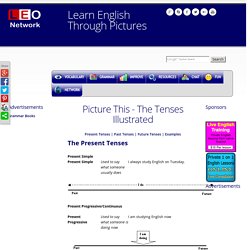
English Grammar. English The Easy Way English The Easy Way.
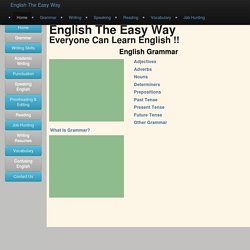
Articles A / An / The. Going to + Infinitive English Lesson Plan (A2) This website uses cookies to improve your experience. We'll assume you're ok with this, but you can opt-out if you wish.Accept Read More. Test Relative Pronouns. Relative pronouns and relative clauses. Relative Clauses. Relative clauses and others. 117 Most beautiful words in the English language. 30 Incorrectly Used Words That Can Make You Look Bad.
While I like to think I know a little about business writing, I often fall into a few word traps. For example, "who" and "whom. " I rarely use "whom" when I should. Even when spell check suggests "whom," I think it sounds pretentious. So I don't use it. And I'm sure some people then think, "What a bozo. " And that's a problem, because just like that one misspelled word that gets a resumé tossed into the "nope" pile, using one wrong word can negatively impact your entire message. Fair or unfair, it happens. The plural of nouns in English - Crossword 2. The plural of nouns in English - Crossword 1. Plural in English, Special forms. Plural in English, Spelling. Plural in English. Plural - Grammar Exercises. Singular, Plural - Grammar Exercise.
Plurals (Irregular) - 3. Singular of nouns in English - Exercise 1. Plurals - 2. Plurals - 1. Meals and Meal Times in English-Speaking Countries. Years ago a student of mine came up to me after class, looking quite perplexed. She asked, ''Why do some English people eat dinner at midday or very early in the afternoon?
'' That's a good question indeed, and the answer to it is not an easy one. Many foreigners find the terminology and customs that accompany eating in English-speaking countries quite baffling. For example, the word dinner is not only the name of the main evening meal eaten in these countries, but it can also be used for the meal eaten in the middle of the day. To understand this better, let's first travel back in time to the 16th and 18th-century England, where the men and women of nobility had a lot of free time on their hands. In the 16th century, the three meals of the day were breakfast, dinner and supper.
Breakfast Breakfast is the first meal of the day. Brunch Brunch is a meal that is usually eaten in the late morning. Learn To Read. Construct-a-Word. Construct-a-Word provides a simple, engaging way for students to generate dozens of different words by first choosing an ending (for example -an, -ed, -at, -op) and then adding a beginning letter or blend. When a correct word is created, the word is stored in a Word Bank where students can read and review their words. For each ending, Construct-a-Word prompts students to create between 6 and 14 different possible words, adding an element of fun and discovery. It uses animation and sound to guide students through the steps of creating words, and employs prompts that are clear and easy to master. This interactive tool could be used individually or in small groups, either in one session or across multiple lessons.
BBC Learning English - The Sounds of English. Free grammarman comics online. English + Pronunciation Lessons. Non-Verbal Communication. Interpersonal communication is much more than the explicit meaning of words, the information or message conveyed. It also includes implicit messages, whether intentional or not, which are expressed through non-verbal behaviours. Non-verbal communications include facial expressions, the tone and pitch of the voice, gestures displayed through body language (kinesics) and the physical distance between the communicators (proxemics). 6 ways to make English part of your everyday life. Twenty Ways to Improve Your English (Slideshare 2) JigWord for English Study - Irregular Plurals #1 (Flash 5 Required) Plural - Grammar Exercises. Nouns, Singular, Plural - Grammar Exercises. Plural exercises - grammar. Plural Online Exercise.
Plural Nouns-Part I. Irregular nouns. IRREGULAR NOUN MOVIE. Irregular nouns in the plural. Plural Nouns Regular Irregular - How to make plural words English Grammar. Rules of Plurals. Singular and plural nouns. The Months Chant. Ordering exercise. What is the weather like today? Months. Seasons, weather and clothes - Basic. Clothes & accessories.
Days of The Week Song For Kids. Months of the Year Song. Spring Song - by ELF Learning. Fall and Autumn Song! - How Many Leaves? Months Of The Year Song. Four seasons. Seasons song. 4 Seasons in a Year kids song. ESL Quizzes - "FOR" or "SINCE" (Barbara Donnelly) Comparative Adjectives English Lesson. Comparatives and Superlatives 1. COMPARISON. Comparative and Superlative. Forming Comparative and Superlative Adjectives.
The comparison of adjectives. As ... as A. As ... as B. Difference Between As and Like. I wish I were… Adjective + Preposition List. Prepositions of time - grammar explanation and free practice test. The Prepositional Phrase. Printer Fabulous! Recognize a prepositional phrase when you see one. At the minimum, a prepositional phrase will begin with a preposition and end with a noun, pronoun, gerund, or clause, the "object" of the preposition. Preposition Rule. There is one very simple rule about prepositions. Verb + Preposition List. Noun + Preposition List. Prepositions for Place: relating "Where" Preposition Summary. PREPOSITION COMBINATIONS: how to use preposition combinations.
Adjective + Preposition Combinations Followed by Gerunds. The Prepositional Phrase. Preposition Rule. British and American accents. Phrasal Verbs Organized by Particle. Punctuation and Capitalization Rules.